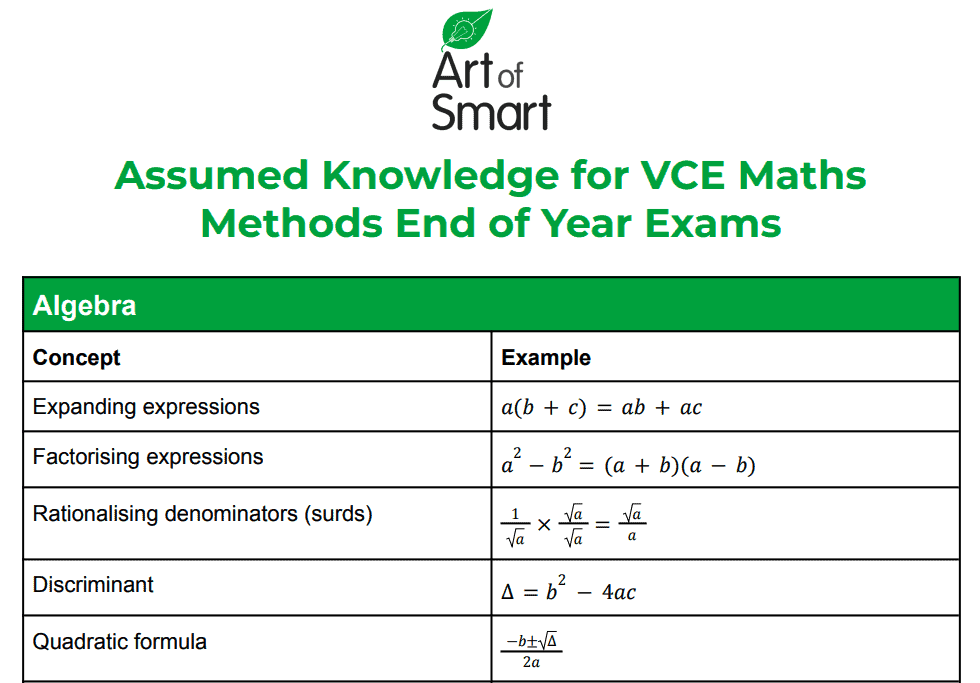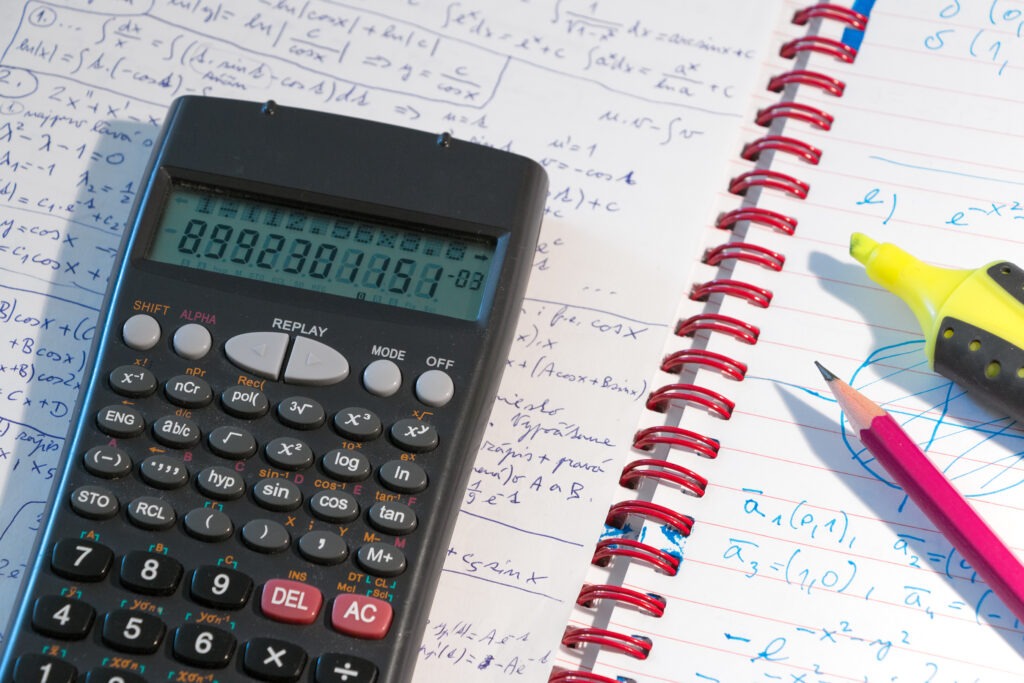To do well in any VCE subject, you’ll need to nail the end of year exams — Maths Methods is no different.
Your preparation doesn’t just start the day, week or even month before the exams. Instead, success will come with effort throughout the year.
In this article, we’ll go through what you should be doing to maximise your chances of success in your end of year assessments for VCE Maths Methods!
Let’s get started!
How will you be assessed in your final exams for VCE Maths Methods?
What You Should Be Doing Throughout the Year
Coming Up to Exam Period
During the VCE Maths Methods End of Year Exams
How will you be assessed in your final exams for VCE Maths Methods?
In VCE Maths Methods, you will have two external assessments. The VCAA guidelines are can be found here, but the short version is:
- Exam 1: No notes, no calculator. Short answer questions only, and the exam is shorter.
- Exam 2: Notes and calculator allowed. Multiple choice and short answer questions, but exam is longer and questions are harder.
This means that you should keep both these exams in mind as you prepare for success.
What You Should Be Doing Throughout the Year
This is the stage where you will be learning concepts for the first time. The key here is to learn things in a way that is effective and useful for your exam.
Let’s go through what this means.
Assumed Knowledge
Everything in Units 1 and 2 Maths Methods is considered to be assumed knowledge for Units 3 and 4. There are certain skills that you will want to be very familiar with, as these will be built on going into Units 3 and 4.
Before you start each topic in class, you should take the opportunity to brush up on this assumed knowledge.
We’ve compiled a list of the most important concepts to brush up on, sorted by topic:
Two key questions to ask yourself for every learned concept:
#1: How do I perform this technique?
VCE Maths Methods is all about knowing how to correctly apply skills to answer mathematical problems. By knowing the intricacies of any technique, this will set you up to answering exam questions very well!
#2: When do I perform this technique?
Your textbook will conveniently teach each concept as its own exercise: e.g. “Chapter 6.2, the Chain Rule.”
In contrast, the external assessments will not tell you which “topic” is covered by a particular question. This is part of the challenge of any VCE examination!
By consciously thinking about when you are able to use a technique, you will overcome a major hurdle faced by many students in VCE Maths Methods.
Preparing the Bound Reference
For Exam 2, you are allowed a bound reference (sometimes called the summary book). This is a collection of notes that you can (and should!) prepare to help you during the exam.
While everyone will have their own way of preparing this, here are a few of our tips:
- You should include a description and fully worked example of every concept you learn
- Also think about including examples of hard questions
- Include some CAS tips and general exam reminders, such as quick CAS commands and reminders to re-read questions etc.
- Make sure it is easy to navigate and find what you are looking for. This includes things like headings and colour coding
Getting the Most out of Your Textbook Questions
Don’t view textbook questions as tedious homework set for the sake of homework — there are ways to get more out of them!
Remember that you have two end of year exams. You should try the questions with this in mind.
For example:
- Try some questions without CAS and without notes. This will mimic Exam 1.
- Try some questions with CAS — maybe try doing these as fast as possible while still getting the question correct. This is a good opportunity to practice CAS shortcuts, which will be critical for Exam 2 success.
Don’t Fall Behind!
The moment you think you don’t understand something, ask a teacher or a study friend!
Everything in Maths Methods is connected to each other, so things can easily spiral out of control if you don’t pick up on it early. This will save you headaches later in the year.
Wondering which VCE Maths subject is best for your ATAR? Check out our guide here!
Coming Up to Exam Period
At this stage, you would have finished most, if not all, of the course content. Now is when you will apply your learning to exam scenarios!
#1: Creating a study timetable
Have a plan of not just what you plan on doing day to day, but also week to week.
Here are some suggestions to help you out with creating a study timetable:
- Spend a week or two going through all of the key content of the course. Make sure you remember what you covered at the start of the year!
- When dedicating time to exams, also account for time needed to review the exam
- Exam 1 is 75 minutes (15 minutes reading + 60 minutes writing) and Exam 2 is 135 minutes (15 minutes reading + 120 minutes writing).
- Don’t treat the timetable as being prescriptive — sometimes things will pop up, so don’t feel that you must adhere strictly to your timetable
- At the same time, don’t use this as an excuse to procrastinate!
- Make sure you set aside some time to relax. Pace yourself, and good health will help you achieve a great study score!
- When planning your study timetable, think about creating small, focussed and achievable goals. Instead of “revise content”, think something like “practice product rule without CAS”.
#2: Completing past exams
There’s no better way to prepare for the exam than to get the authentic experience for yourself. We have compiled a list of past VCAA exams — we encourage you to check it out!
However, don’t just mindlessly complete exams. Here are some ways to get more out of your past exams:
- At first, your goal should be to answer questions correctly. Don’t stress about time or notes.
- Once you get a handle of how exams work, slowly add in time and note restrictions. Perhaps give yourself 90 minutes writing time for exam 1, slowly wind down to 60 minutes, and even think about going to below 60 minutes.
- When you get an answer wrong, don’t just look at “what was the correct answer.” Ask yourself “how should I have reached the correct answer?” and this should be the takeaway that you use to try and improve in future exams
- At some point, try to do practice exams not only under timed conditions, but also in a similar physical and internal environment (e.g. similar time, sleep and eat as you intend before the exam, etc.)
#3: Know what VCAA wants
For questions worth 1 mark, usually just the answer is fine. In these cases, knowing how to get to the answer quickly will save you crucial time for other questions!
The exception to this are questions which use the command term “show that”. These will require full workings.
For questions worth more than 1 mark, you will need to show adequate working. A common question students have is how this applies to Exam 2 where you have a CAS.
In general, setting up an expression is a good guideline for working, and then use CAS to complete the expression. Don’t waste time doing this by hand!
#4: Know your calculator
Your calculator is a powerful instrument, but there will be things it can’t do. Some things to check:
- Can it handle pronumerals?
- How does it treat trigonometric general solutions?
- Can it simplify expressions properly?
Below are a few CAS functions which may be useful to you in the exam:
- Dynamic graph
- Judge (Classpad) or = (TI-nSpire)
- E.g. validate that sin(2x) = 2sin(x)cos(x)
- tanLine (Classpad) or tangentLine (TI-Nspire), for finding equations of tangents
- E.g. find the equation of the tangent to the graph y=x2 at the point x=a
- Define f(x)=
This is not an exhaustive list -—you should add your own! Spread knowledge amongst a study group to broaden your skills.
#5: Get a tutor
It’s no secret that students who have tutors do better overall in their final exams.
Not only can a tutor offer moral support, but they will equip you with exclusive practice questions and confidence that no other student has!
Check out our local VCE Maths tutoring in Melbourne to get booked in with one of our expert tutors today!
#6: Tailoring revision to your needs
Make note of particular areas of weakness, whether this be throughout the year or consistently difficult questions in exams. Prioritise improving in these areas of weakness — this will improve your results more than practising what you’re already strong at!
Things you might do could include:
- Reviewing sections of the textbook relevant to the area of weakness
- Trying to explain the principle to yourself and asking for help when you get stuck
- Explaining a practice question to yourself also asking for help when you get stuck
During the VCE Maths Methods End of Year Exams
Here’s where all your preparation will come to fruition! Here are some of our tips to help you out.
#1: Plan for reading time
15 minutes is a long time, and effectively using this time will help you massively. Some tips for reading time:
- Note what questions look hard or unusual
- The later questions are usually harder. Make a decision as to whether this means you’ll look at these first or last
- Mentally make a note of any questions which look like they might have a trap in them
#2: Know when to skip questions
For example, if you don’t make progress after 1 minute, consider moving on. You may feel that you are “close,” but you will lose out on easier marks by not skipping ahead.
#3: Look at other parts of the question
In Exam 2, questions have multiple components. If you can’t answer one component, have a look at the later components, because some of them will be much easier
#4: Make sure you have an approach to double checking
Look closely at every number you write — are there any arithmetic errors?
And, that’s how you ace your Methods exam!
Check out some extra resources for VCE Maths Methods here:
- The Ultimate Guide to VCE Maths Methods Unit 1 and 2 Practice SACs
- How to Ace Your End of Year Exams for VCE Maths Methods
- Everything You Need to Know from the VCE Maths Methods Study Design
- VCE Maths Methods Past Papers Master List
- The Ultimate 7 Day Study Plan for Your VCE Maths Methods Exam
Are you looking for some extra help with preparing for your VCE Maths Methods end of year exams?
We have an incredible team of VCE tutors and mentors!
We can help you master the VCE Maths Methods study design and ace your upcoming VCE assessments with personalised lessons conducted one-on-one in your home or online!
VCE Maths Methods can be incredibly challenging! Get an expert VCE tutor in Box Hill to help!
We’ve supported over 8,000 students over the last 11 years, and on average our students score mark improvements of over 20%!
To find out more and get started with an inspirational VCE tutor and mentor, get in touch today or give us a ring on 1300 267 888!
Kevin Chen recently completed his Bachelor of Biomedicine at the University of Melbourne. He is now undertaking an Honours year, where he is investigating the rise of hospital superbugs. Kevin lives by the motto “smiles go for miles!”






